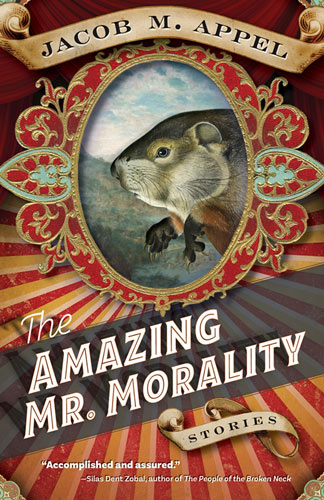The Amazing Mr. Morality
The Amazing Mr. Morality is a collection that dives head first into the shallow end of a pool full of ethical dilemmas. Jacob M. Appel creates wild worlds just inches beyond reality, but still close enough to the real deal that you can absolutely imagine them coming true. The writing is sharp, the characters are witty, and the stories are original.
The Amazing Mr. Morality is a collection that dives head first into the shallow end of a pool full of ethical dilemmas. Jacob M. Appel creates wild worlds just inches beyond reality, but still close enough to the real deal that you can absolutely imagine them coming true. The writing is sharp, the characters are witty, and the stories are original.
The opening story “The Children’s Lottery” is a misleading tale. The title would have you believe that the children have a lottery tailored toward them, but, in reality, the winning child is the prize of the competition. The main character, a school teacher, is distraught when her classroom becomes the pool of children to be chosen from: “I keep thinking about the parents. How would you feel if your child was carried off to life in a pedophile camp?” Pedophiles are no longer locked away, and in this altered reality one child is sacrificed to them yearly to keep the peace, darkness made ordinary and acceptable in this timely piece.
Have you ever lost your dog? Do you remember the all-consuming worry you just couldn’t shake? In the story “Tracking Harold Lloyd,” the characters are facing this very dilemma while struggling with perseverance and faith in the unseen. Lauren, the little girl next door, is consumed with this worry when her elderly neighbor’s dog—Mr. Harold Lloyd—goes missing. Lauren and her mother hang up fliers and vow to look for him, but at the end of the day he’s still missing. Lauren’s mom is left wondering just how long Mr. Harold Lloyd has really been gone.
“Next of Kith” is an exploration of the complicated relationship between an older man with no nuclear family and the neighbor he has a crush on. When Harry suffers a stroke, the hospital is forced to call the one phone number in his wallet—Emma Inkstable, his neighbor. With no kin to take care of him, Emma fills the role of ‘Kith,’ and maybe starts to fall for him as well.
The namesake novella at the end of the collection follows Ted Grossbard’s experience as Mr. Morality, the voice of a newspaper column that answers ethical questions. Soon, though, a rival newspaper starts their own ethics column and the two authors battle it out. “Sometimes, the path to morality loomed clear, but a man chose not to follow it.” Grossbard’s hatred for “Dr. Ethics” soon spirals out of control and he must face his own moral and ethical dilemmas.
The stories are familiar enough to draw the reader inside, but so imaginative that they hold them captive to the very end. Jacob M. Appel’s collection is reminiscent of the otherworldly episodes of “Black Mirror” and the popular dystopias over the last decade, so fans of these are sure to fly through the pages of The Amazing Mr. Morality.





